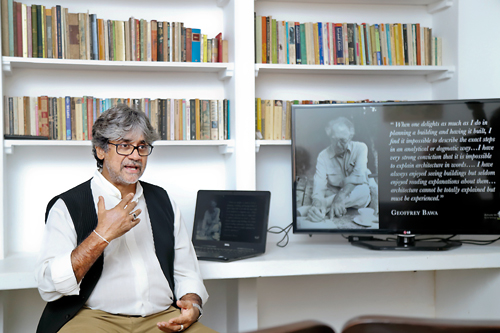Talking architecture award in a classic Bawa room
The music room of the de Saram house overflows with Geoffrey Bawa’s gloriously catholic taste in the arts: a grand piano, jewels of art from the ‘43 Group, and walls lined with a vast miscellany of paperbacks. The room also embodies the classic Bawa character: the shady tropical garden wanders indoors while itself constituting ‘a series of outdoor rooms’.

In the house that Bawa built: Channa Daswatte inviting applications for the GB Award 2019-2020. Pic by Ishanka Sunimal
Within the music room are the organizers of the fifth cycle of the Geoffrey Bawa Award for Excellence in Architecture, named after the greatest of our modern architects.
Tucked into Ward Place, this gallery of a house was built for a ménage of musicians. It is evening and the interplay of shadow and light that Bawa so painstakingly evoked is displayed at its best- across the grand piano, in the corners of the garden. An apt place to discuss the 2019-2020 cycle of the Geoffrey Bawa award.
“You don’t even have to be an architect to enter,” says Channa Daswatte, Chairperson of the Geoffrey Bawa Trust. In the past, designs by non-architects have been shortlisted.
And, reflecting that Bawa was a man of many arts, the award is pretty open-ended, making eligible the broadest possible architectural designs- ‘even a bus halt’ quips Daswatte. The only criterion: it should have been built in Sri Lanka in the ten years between July 23, 2009 and July 23, 2019, and occupied for no less than nine months.
The award is triennial and has amassed much prestige over the years since its beginnings in 2007.
Daswatte stressed the importance of architecture for the community- a way of healing divisions in such troubled times as ours. Some of Bawa’s buildings, we may remember, were in the service of community, like the Yahapath Endera Farm School- that delightfully simple, spartan haven where Mediterranean simplicity blends with local architecture in shaded dormitories and terraces.
Daswatte reminds that those who submitted and did not win in previous cycles can resubmit- “because the debate could be different, with a different panel of judges.”
For that is what the Bawa award purports to be, at its heart- an ongoing conversation on architecture. Modelled on the highly prestigious Aga Khan Award for Architecture, the award’s judges will make sure that all the buildings are visited and examined- instead of perusing designs on paper as indeed happens with many awards. With the average entries numbering around 60, this will be an odyssey across the island.
This year being Geoffrey’s Bawa’s birth centenary the trustees look forward to a greater number of entries. The judges’ panel comprises Sunethra Bandaranaike of the GB Trust as chair, Veranjan Kurukulasuriya, President of the Sri Lanka Institute of Architects and Professor Barry Bergdoll (in the role of ‘an architect from outside the country’) from Columbia University. This year’s ‘learned layperson’ in the panel will be former diplomat, Jayantha Dhanapala.
The iconic award, shaped like an obelisk, has been copied off the gateposts leading to the garages of Bawa’s estate Lunuganga- a timeless composition which, Channa reminds, runs like a motif through ancient Egypt, Assyria and Greece to Renaissance Italy. The winner will receive Rs one million.
Daswatte says that the de Saram house will be open to the public to stay, a hideout that will be specially relished by foreign Bawa fans and those who embark on their Bawa ‘pilgrimages’- meandering from Lunuganga to Kandalama to the Ena de Silva house. While the award itself celebrates what is being built today, the renovation of Bawa buildings like this house ensures that our contemporary heritage is preserved- for they are all vital clues that illustrate, for posterity, how the idea of ‘modernity’ was moulded.
Applications for the award are open from August 25, 2019 on www.geoffreybawa.com. There will also be a paper application form- to be collected at the Geoffrey Bawa Trust, No. 11, 33rd Lane, Bagatelle Road, Colombo 03. The closing date for entries is November 30, 2019.


